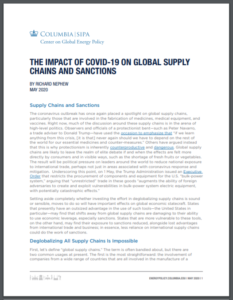Full Title: The Impact of Covid-19 on Global Supply Chains and Sanctions
Author(s): Richard Nephew
Publisher(s): Columbia University Center on Global Energy Policy
Publication Date: May 8, 2020
Full Text: Download Resource
Description (excerpt):
The coronavirus outbreak has once again placed a spotlight on global supply chains, particularly those that are involved in the fabrication of medicines, medical equipment, and vaccines. Right now, much of the discussion around these supply chains is in the arena of high-level politics. Observers and officials of a protectionist bent—such as Peter Navarro, a trade adviser to Donald Trump—have used the occasion to emphasize that “if we learn anything from this crisis, [it is that] never again should we have to depend on the rest of the world for our essential medicines and counter-measures.” Others have argued instead that this is why protectionism is inherently counterproductive and dangerous. Global supply chains are likely to leave the realm of elite debate if and when the effects are felt more directly by consumers and in visible ways, such as the shortage of fresh fruits or vegetables. The result will be political pressure on leaders around the world to reduce national exposure to international trade, perhaps not just in areas associated with coronavirus response and mitigation. Underscoring this point, on 1 May, the Trump Administration issued an Executive Order that restricts the procurement of components and equipment for the U.S. “bulk-power system,” arguing that “unrestricted” trade in these goods “augments the ability of foreign adversaries to create and exploit vulnerabilities in bulk-power system electric equipment, with potentially catastrophic effects.”
